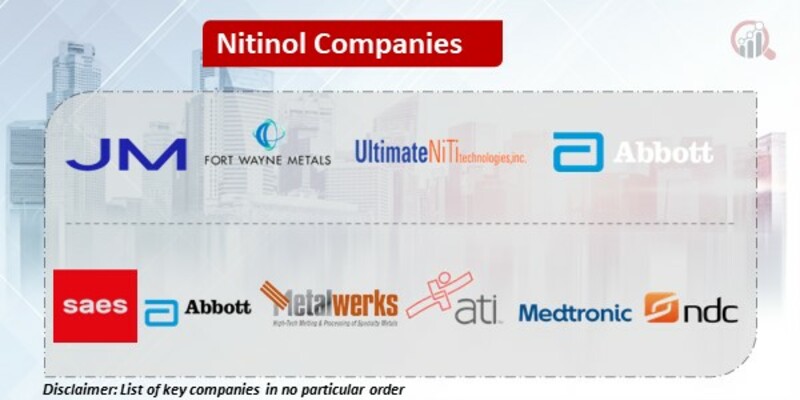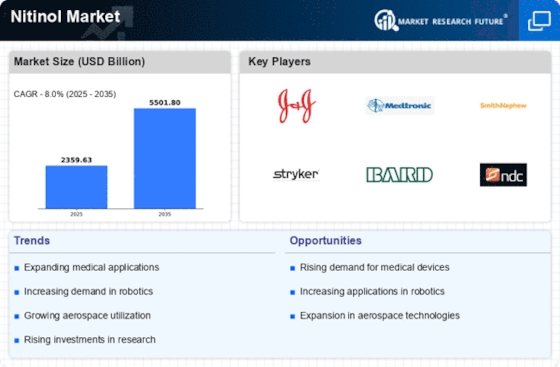Top Industry Leaders in the Nitinol Market

Nitinol, a nickel-titanium alloy known for its unique shape-memory and superelasticity, has revolutionized various industries, particularly medical devices. Its remarkable ability to return to its original shape after deformation makes it ideal for stents, implants, and surgical tools. The Nitinol market, while relatively niche, boasts a dynamic and competitive landscape, with players vying for a share in this high-growth segment.
Strategies Shaping the Game:
-
Product Diversification: Leading companies like Johnson Matthey and ATI are expanding their offerings beyond traditional medical applications, venturing into aerospace and automotive sectors. This diversification mitigates risk and capitalizes on emerging opportunities. -
Vertical Integration: Integration into the supply chain, from raw material processing to finished device manufacturing, offers cost control, quality assurance, and agility in responding to market demands. Companies like Nitinol Devices & Components exemplify this trend. -
Research & Development: Continuous investment in R&D fuels innovation and propels market leadership. Entwicklungsgesellschaft fur Nitinol-Technologien (EGNT), a German pioneer, is actively developing biocompatible Nitinol grades for next-generation medical implants. -
Collaborations & Acquisitions: Strategic partnerships with research institutions, universities, and startups accelerate innovation and access to new technologies. Mergers and acquisitions like the recent acquisition of Nitinol Technology Group by Boston Scientific aim to strengthen market presence and expand product portfolios. -
Geographical Expansion: Emerging economies like China and India offer vast untapped potential. Established players are setting up manufacturing facilities and distribution channels in these regions to cater to the growing demand.
Factors Driving Market Share:
-
Regulatory landscape: Stringent regulations in the medical device sector pose both challenges and opportunities. Compliance with complex regulatory requirements like FDA approval can create barriers to entry, favoring established players with proven track records. -
Intellectual Property: Strong patent portfolios protect proprietary Nitinol processing techniques and device designs, giving incumbents a competitive edge. Companies like Fort Wayne Metals are actively building their IP portfolios through strategic patenting. -
Economies of scale: Large-scale production facilities enable cost-effective manufacturing, lowering production costs and enhancing price competitiveness. This favors established players with significant production capacities. -
Brand reputation: A strong brand reputation for quality and reliability is crucial in the medical device market. Companies like Cook Medical leverage their established reputation to gain trust and market share. -
Distribution channels: Robust distribution networks ensure efficient product delivery to hospitals and medical facilities. Companies like B. Braun SE invest in building strong relationships with distributors and healthcare providers to gain market access.
Key Companies in the nitinol market include
- Nitinol Devices & Components
- SAES Getters
- Johnson Matthey
- ATI
- Fort Wayne Metals
- Metalwerks PMD
- Ultimate NiTi Technologies
- Abbott
- Medtronic
Recent News
Stryker Corporation launched an EasyFuse Dynamic Compression System using a nickel-titanium alloy metal called Nitinol in May 2022. The objective of this material’s strength and shape recovery is to reduce surgical complexity and waste in the operating room (OR).
During February 2022, the Cordis Health S.M.A.R.T. The control nitinol stent system attained the United States Food and Drug Administration’s (USFDA) approval for a new delivery system allowing trans-radial approach use. This system is meant to be used in patients suffering from the disease of iliac arteries; hence, its purpose is indicated by the name Iliac Artery Stenting System.
New transradial approaches were normally preferred by pathologists instead of traditional transfemoral ones due to various gains, including fewer bleeding problems, improved patient comfort and a faster healing process. By approving this new delivery system, Cordis Health hopes to increase the versatility and ease of use associated with the S.M.A.R.T Control nitinol stent system, thus widening its market base and improving patient care.
In another incident, Confluent Medical Technologies announced partnerships with original equipment manufacturers (“OEMs”) medical device manufacturers in 2022 while TPG Capital made a majority investment agreement into them.










